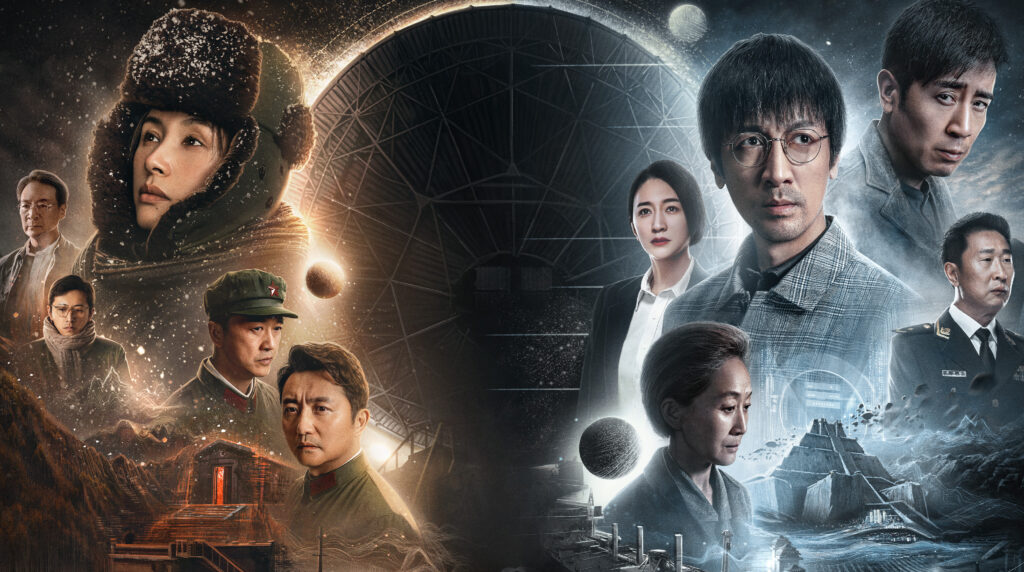AKA: Area scientist verbally abused by suspended police officer
OVERVIEW
Media type: TV show
Streaming service: YouTube (free with ads)
Genre: Sci-fi, thriller, horror
Content warnings: Suicide mentions (I think the record is about five in a minute), cosmic horror
Notes: Three-Body is a Chinese show, and as far as I’m aware, there’s no dub available. There are subtitles available, but as my Mandarin-speaking stepmother has noted, the translation is somewhat awkward at times. Still, that hasn’t prevented me from enjoying the show. I won’t judge you if you can’t handle it.
SUMMARY
The Sun. A glorious body of plasma, vomiting out more energy in a single second than most of us can even conceive of, let alone make use of in our lifetime. The view rapidly moves out, past Mercury and Venus, stopping at Earth for a moment before continuing on its journey, pausing briefly to greet Voyager 2, not even bothering to slow down as we pass Uranus and Neptune, screaming past the Oort Cloud and out and out until we see the entirety of our galaxy, dozens of other galaxies! It continues moving, rapidly becoming a mountainous landscape, tiny imperfections at the end of a cylinder, surrounded by lots of other cylinders, mountains, strands… a piece of paper with holes in it. Okay? Uh. Not sure, uh, why this scene was, uh, in the episode… I’m not quite sure what they’re trying to say. I’m confused. Help.
A revolutionary song plays in the background as ticker tape spills from a printer. A person grabs it, examines it. Oh, cool, this revolutionary song hates fascists too! They sit down at a computer, typing… “the deciphering was complete”.
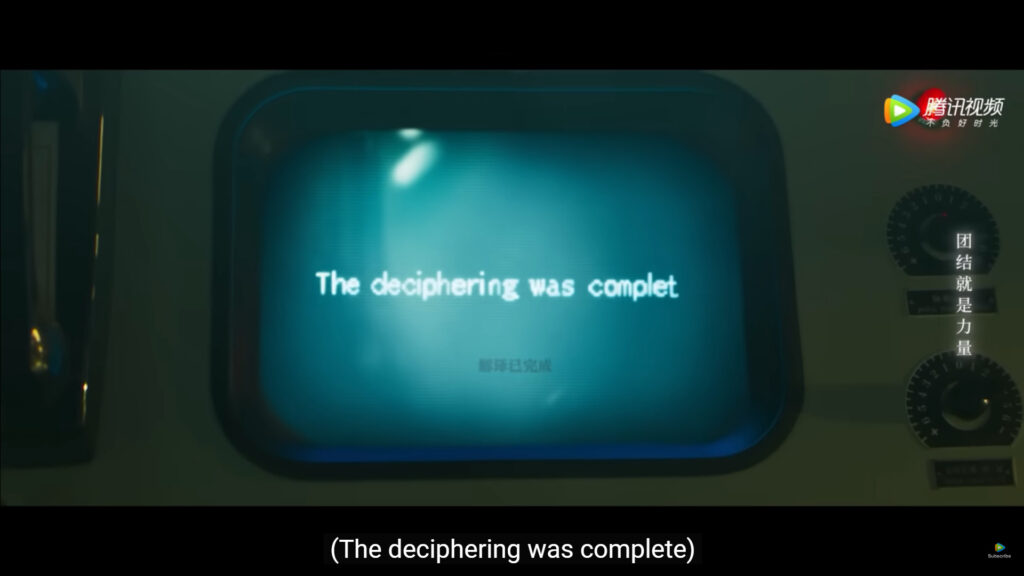
The message we receive is simple, once decoded: “do not answer”. Seems to me like we shouldn’t answer, guys. Our mystery person continues, though, entering what’s clearly a control room. She sits down at a disgustingly, gloriously 70s console, and gets to work, referencing an astronomical almanac to program co-ordinates into a big satellite, pointed directly at the sun. As the seconds tick to noon, her finger hovers over the big red button…
Title sequence! One of many used in this show. Now, I am a big proponent of shows having a strong title sequence. It’s part of a show’s identity. You hear that music, you see that title sequence, you know it’s time for Stargate, or Star Trek, or whatever you like. Three-Body does the complete opposite, having at least four different title sequences over the course of one season, with three different pieces of music playing over it. Weirdly enough, I think it works! It’s a rejection of traditional thinking in TV, forging identity through a multitude of identities.
The title sequence is also more spoiler-y than the BSG reboot. While BSG is content to use flashes from the upcoming episode, Three-Body is more ambitious, using images from stuff ten episodes down the track. Only a lack of context prevents anything being actually spoiled. Phew!
As the title sequence ends, we are thrust into the heady world of Summer, 2007. In a block of flats in Beijing, somebody sits at a table, writing a note. They stop, look up, to see an ant crawling on the glass of the window in front of them.
“Physics doesn’t exist”, they say. Alright! Cool! I’m going to admit, this line continuously comes across as full of… that thing where you’re trying so hard to be dramatic but it ends up being funny instead. Cut to outside at night, the police have shown up and are setting up a cordon. We re-enter the apartment, various police and associates discussing the circumstances, before we come across the body. A famous physicist, apparently, has overdosed on sleeping pills, leaving a mysterious note: the enigmatic “Physics doesn’t exist”.
As the body bag is closed, a series of black 4WDs race onto the scene, and a bunch of well-dressed folks pour out, as well as one guy who looks like he should be sitting alone on his couch, drinking beer, on a night like this. Is that our protagonist? He has protagonist vibes.
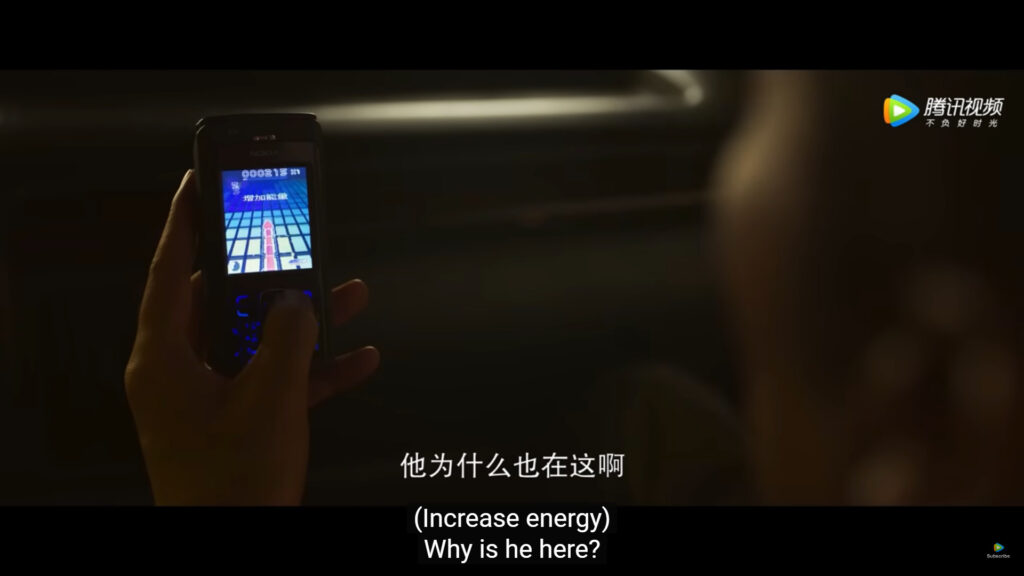
The military has taken over this police investigation, for reasons unknown. Evidence is handed to our Snake-Playing Protagonist, Shi Qiang – a suspended police officer, based on dialogue – to which he remarks “physics doesn’t exist, again?”. Such a specific thing to have encountered before. Interesting, is it not? Already, we see the hints of the wider plot being played out here. A meeting is mentioned, the invitation of scientists is mentioned – and cut to tomorrow, where in another block of flats, another person is in a dark room. Well, a red room–a room for developing photos, anyway. I’ll always respect somebody that develops their own photos. It’s a really cool process!
In another room, a TV plays a news article relating to suicides among the scientific community, starting in 2005. As our photo developer enters, we pan over (ha) to an interview being conducted with a man named Pan Han, noted biologist, who compares our rapid technological development in the modern age to a kind of cancer. Jeez, he must be fun at parties. A knock at the door, and our Snake-loving protagonist, Shi, arrives – with military escort, too! Shi asks our photo developer, Wang Miao, if he’s recently spoken with anybody belonging to a group called “the Frontiers of Science”.
Wang is a little perturbed. The Frontiers of Science is a very public, very famous international group. Is he not allowed to contact them? Shi can’t help but laugh at Wang’s assumptions, however. Wang is still having none of it, politely telling Shi to, in short, piss off. Shi doesn’t react well, and almost has to be manhandled away as one of his escort steps in, far more politely asking Wang to attend a special meeting. Wang is busy that day, however – but this doesn’t perturb the military man, who has apparently already arranged to clear his schedule for the afternoon. Bit presumptuous, isn’t it? Shi returns to the scene just as the door closes, with a closing comment: “how could a scientist be so rude?” An aphorism about pots and kettles comes to mind… with the door closed, Wang takes the opportunity to overhear a conversation from the military men outside. Apparently, Shi Qiang had been specially requested by the General at the “Battle Command Centre”, so he must be hot shit if they’re willing to put up with his major attitude problem! Wang, meanwhile, wonders just what the fuck he’s been dragged into.
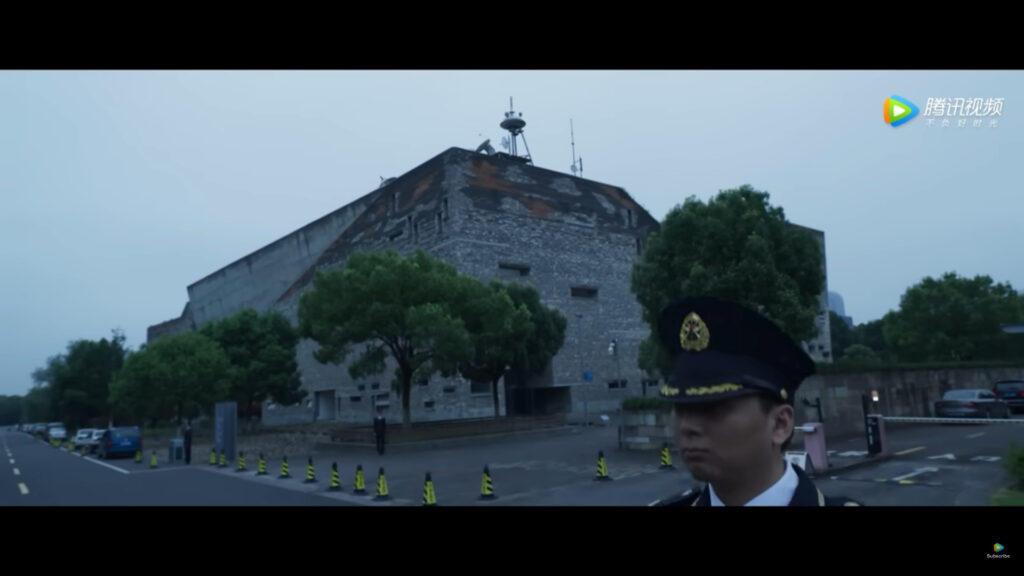
Later that day, Wang arrives at the Battle Command Centre, an almost surreal place – intense military planning takes place in an open-plan office space, watched over by a fossilised dinosaur hanging over the main room. And who should arrive to escort Wang to the meeting but the rude and abrasive Shi – although he does offer an apology for his behaviour earlier, and Wang is apparently an understanding man. All is forgiven.
A brief explanation of just how damn weird the Battle Command Centre is (apparently it was supposed to be an art museum, but was requisitioned before opening? I suppose even the military needs pretty pictures), and the two go on a brief tour, as Shi asks about Wang’s research: nanomaterial. Specifically, nanowire. He questions the criminal utility, to which Wang says “everything has criminal utility”. Shi agrees, recounting a case he worked in which somebody was murdered with a frozen fish. Real Roald Dahl vibes there. Do you suppose the perpetrators then cooked the fish and fed it to Shi, too? Great way to hide the evidence.
Meeting time! The attendees are a surprisingly cosmpolitan group, consisting of military members from all around the world. Shi interrupts to make commentary about the meeting content – just like I’m doing right now – and how they always pump folks for info, without ever revealing anything of their own. So it’s basically every staff meeting in the entire world. He bemoans his lack of information as introductions continue.
Today’s topic of discussion is the recent spate of scientific suicides around the world. Delightful! Attributed to a mysterious “enemy”, a list of some of the most recent victims is handed around – and one of them, Wang recognises. Yang Dong, our scientist in the opening scenes of the episode! The assorted attendees are invited to look over the suicide notes, all of which contain a variation on the phrase “physics doesn’t exist”.
The meeting moves on to discussing the Frontiers of Science, with whom many of the suicidal scientists were associated. That’s, uh, actually really suspicious. One of the other attendees is called upon to brief us on what the Frontiers of Science actually believe: they’re some kind of postmodernist scientific movement, reacting to the increasingly theoretical nature of modern physics by trying to discover if there is actually a limit to what science can divine about our universe, and if so, what that limit is.
Afterwards, the General introduces himself to Wang, identifying himself as Chang Weisi. He asks a few questions about the Frontiers of Science meeting that Wang attended a few months ago, which Shi immediately hijacks to turn into an interrogation. Chang is not pleased.
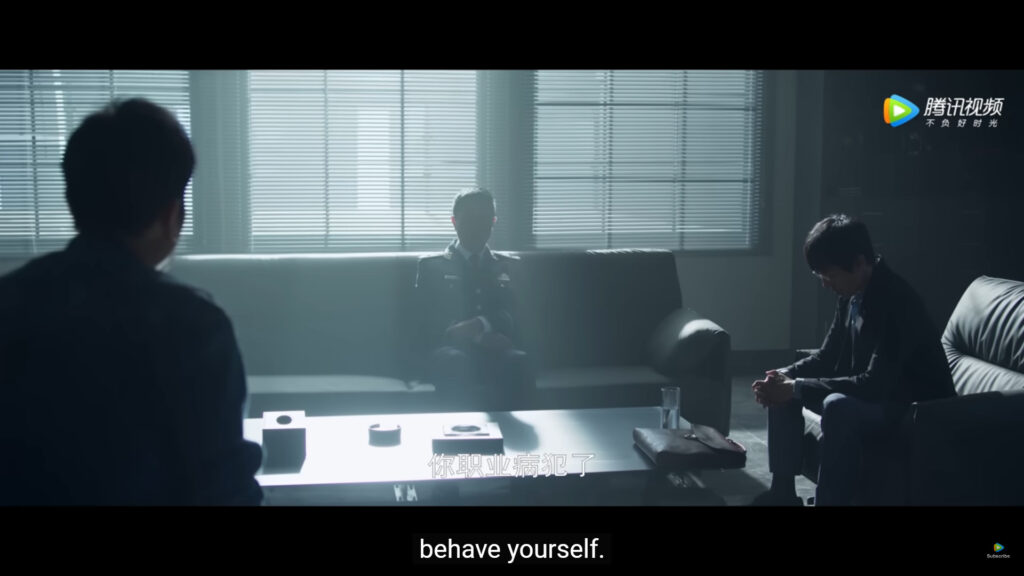
Wang can’t remember much apart from the woman who invited her, Shen Yufei. Chang eventually invites Wang to a mission to infiltrate the Frontiers of Science – being a scientist, albeit more an engineer than theoretical physicist, he’s exactly the kind of person they’d welcome into their ranks. Shi is very amused.
Wang refuses, and Chang is like “thanks for your time, sorry to waste it”. Shi, meanwhile, launches into the most obvious, most transparent attempt at reverse psychology I have ever seen, real or fictional. It’s funny how obvious it is – which I kind of think is the point. It’s obvious, it’s transparent, and yet that makes it all the more compelling. Just what could be so interesting about this academic group? Chang is really not amused, directly telling him to get out. Shi walks out laughing. Gods, he’s such an asshole. I love him.
Chang walks Wang back to the exit, taking the opportunity to explain Shi’s behaviour, and elaborate upon exactly why he’s here (apparently he’s both former military and a really damn experienced cop?). Wang is confused, though: what does an academic group influencing people into suicide have to do with the military? War has everything to do with the military, apparently, leading Wang to wonder just what war he could possibly be on about. There are no hotspots in the world at the moment! Apart from Iraq, Afghanistan, and half the Middle East. Guess they just don’t exist.
Chang goes on something of a tangent, asking if Wang had ever undergone an experience so radical that it fundamentally changed how he viewed the world. He hasn’t. Chang claims that this makes him fortunate, that almost everyone is fortunate, the species itself is fortunate. Humanity has undergone no extinction-level crises, barring that one time when the human population was reduced to about 10,000 after a supervolcano eruption. But, if it’s all luck… what if that luck is about to run out? Chang ends the conversation there, bidding a very confused Wang farewell, almost as if he realises how dramatic he’s being. As Wang leaves, he goes over everything he’s been told today…
We find ourselves ten months ago, at a very impressive particle accelerator facility. Wang is touring the facility and taking lots of photos, his lab apparently having provided some of the equipment in use at this chonky boi of an atom smasher. As he’s discussing this with a scientist, somebody brings the results of the latest experiment to Yang Dong, which she reviews, rapidly growing horrified.
Earlier that day, we see a meeting between Shen Yufei and a Professor Munphy (is that a real name? I hope it’s a real name, I kind of like it), wherein Shen hands Munphy results from the experiment that Yang Dong is just about to undergo. He asks where Shen got the data from – you can’t have results from an experiment that you haven’t even finished yet!
As the experiment comes to a close and results come in, Munphy calls Yang Dong at the accelerator, and requests a copy of the results. Yang Dong sends them over, and Munphy compares what he’s just been given to the results that Shen gave him earlier today. Somehow, despite the fact that the experiment was a failure, delivering results consistent with no standard model, Shen got them about two hours before they were published. Munphy questions her again, but Shen is having none of it, instead choosing to wax philosophical about the limited perspective of an ant on the other side of a window. This has got to be a metaphor for something.

As Shen prays to the Buddha for her “lord” to be lifted from misery, Munphy makes the choice to end his life, stating “it doesn’t exist. Not all this nonsense.” Whoever this Shen Yufei is, she’s bad news.
We return to the Battle Command Centre in the relative present, where Chang and Shi discuss other potential candidates for infiltrating the Frontiers of Science. Shi, however, is insistent on Wang – he’s something of an odd duck amongst invitees, being a nanotech engineer rather than a theoretical physicist. Shi wants to know why.
Shen Yufei converses with a mysterious man, also discussing Wang Miao, and his nanotech research. Despite it being nowhere near mass production, he could be a threat to the mysterious agenda of these mysterious people.
A brief montage later, and we return to the 70s, to the button press teased earlier. As a satellite beams a signal to the sun, we are treated to some narration:
Come here. I'll help you to get the world. My civilisation is unable to solve its own problems. We need your strength for intervention.
Episode end.
DEE’S THOUGHTS
Colour me utterly fascinated. We’re presented with a truly odd mystery, and a colourful coterie of characters to crack the case. The episode delves into some truly out-there science, claiming that the fundamental underpinnings of science are no longer valid. Whoever is behind this spate of scientist suicides, signs suggest a sinister plot. The seeds of a cosmic investigation are laid, and I can’t wait to see what grows from them, a feeling only enhanced by the tantalising glimpses we’ve given.
- This series notably averts the Omnidisciplinary Scientist trope almost omnipresent in sci-fi – Wang Miao notes on two occasions that a lot of the more theoretical stuff goes over his head. More things need to do that!
Overall, I think I’ll give this episode… the sudden cessation of physical law out of ten.

